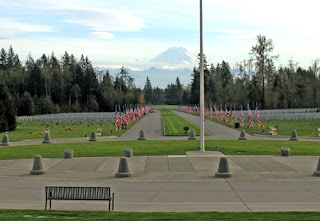 |
| Tahoma National Cemetery Imagine credit: https://www.cem.va.gov/cems/nchp/tahoma.asp |
My uncle Cole died in October. I want to write a dedication to him, to remember the man that he was. But as I sit here trying, I find that I’m incapable of doing it. I did not know him. He exists in my memory as a silhouette, a sketch. This is not a criticism of him as a person. As kids, we never spent much time with any of my extended family. I imagine there is a story there. Maybe one day I’ll hear it.
Rachel and I attended his funeral a few weeks ago. It was
raining. Very on-brand for the Pacific Northwest. The ceremony was held in an
outdoor shelter surrounded by trees. The rain rat-a-tat-tatted on the roof as
the officiant explained the history of Tahoma National Cemetery. It is the only
national cemetery in Washington. Tahoma is the name for Mount Rainier in the Lashootseed
language. The location of the funeral is a clue to Uncle Cole’s past. He served
in the military. The honor guard was composed of former Marines. Another clue?
The honor guard raised their rifles and fired into the sky.
Crack. A blast of color and noise in defiance of the gray clouds and droning
rain. Crack. More noise, more fire. A final crack. The noise echoed in my ears and
faded until I could hear the tapping of the rain again.
The officiant talked about the significance of Cole’s
service. How his time in uniform fulfilled the symbolism of our flag, those red and white
stripes, that field of blue. By joining, by serving, he defended freedom and
justice. In the eyes of the military, he did his part.
The officiant read a Psalm. He read a poem called “Immortality”
by Claire Harner. The flag unfolded. Stretched out. Was presented with a snap. It
was refolded with military precision. With controlled violence. It was
presented to Angela, Cole’s daughter.
The ceremony was beautiful and simple and military in its
precision. And it was anonymous. They did not recount Cole’s service record.
They did not give his birthday or the date of his passing. As I sat there, I
was struck that this exact ceremony could have been performed for any former
Marine. Then Angela stood, and she thanked everyone for coming. And there were tears and hugs and whispered condolences. It was her, a
living piece of Cole, that made the moment unique.
I did not know my Uncle Cole. The few conversations I had
with him over the years were short. The sort of awkward small talk that people have
when they are supposed to know each other but don’t. I cannot speak of his
legacy. Of whether he was a good man or a bad man or, more likely, something in
the middle. All I can say of him is that he is gone.
Rest well, Uncle Cole. I hope to meet you in heaven where
cancer doesn’t take from us the ones we love. Where pain has no home. Where we
stand with God in perfect union.
-Tom
P.S. The poem "Immortality" was presented by the officiant as an anonymous Native American poem. I wanted to find out which tribe wrote the poem because the term Native American is about as specific as European. It turns out that there is some dispute about the authorship of that poem. Mary Elizabeth Frye claims to have written it in 1932 with the title, "Do Not Stand at my Grave and Weep." Claire Harner published the poem as an original work in 1934. People have also attributed the work to the Hopi or Navajo tribes. The consensus is that Ms. Harner wrote the work, but we can add this to the list of things we won't know for certain. It remains a mystery.
Comments